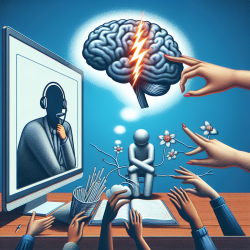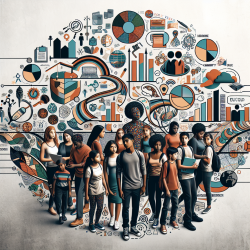Interface Between Mental Health and Earthquake: A Guide for Online Therapy Practitioners
The recent study titled "Interface between mental health and the earthquake: considering humanitarian endeavor" sheds light on the profound impact of natural disasters on mental health, particularly focusing on the recent earthquake in Afghanistan. This research is crucial for practitioners in the field of online therapy, providing valuable insights and strategies to improve mental health support for affected individuals.
Understanding the Psychological Impact of Earthquakes
Earthquakes can significantly exacerbate mental health issues such as depression, anxiety, post-traumatic stress disorder (PTSD), and substance abuse. The psychological response to such disasters often follows a phased approach, beginning with immediate shock and potentially leading to prolonged recovery periods. Afghanistan's geographical and political landscape further complicates the mental health crisis, with frequent natural calamities and ongoing conflicts contributing to a high prevalence of psychological disorders.
Key Findings from the Research
- Approximately 47% of the Afghan population experiences mental health problems.
- The earthquake in October 2023 led to significant mental health issues due to factors like physical trauma, loss of loved ones, and displacement.
- The lack of mental health services, coupled with societal stigma, impedes effective psychological support.
Implementing Research Outcomes in Online Therapy
For practitioners in online therapy, incorporating the following strategies based on the research findings can enhance the support provided to individuals affected by earthquakes:
- Telemedicine: Utilize telemedicine to reach individuals in remote areas. This approach can provide anonymity, which is crucial in regions where mental health stigma is prevalent.
- Gender-Sensitive Counseling: Establish counseling teams with a balanced gender composition to ensure women can access mental health support in a culturally acceptable manner.
- Recreational Activities: Integrate recreational activities in therapy sessions to help channel the energy of young individuals and improve their mental wellbeing.
- Employment Initiatives: Encourage activities such as sewing or tailoring as part of a holistic rehabilitation approach to improve mental health through economic empowerment.
Encouraging Further Research
Practitioners are encouraged to delve deeper into the study to understand the multifaceted impact of natural disasters on mental health and explore innovative solutions tailored to the unique challenges faced by affected populations. Continuous research and adaptation of therapy practices are essential to effectively address the evolving mental health needs in disaster-stricken regions.
To read the original research paper, please follow this link: Interface between mental health and the earthquake: considering humanitarian endeavor.










